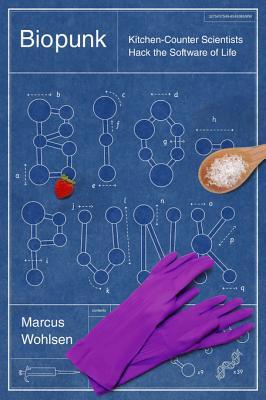
Biopunk
DIY Scientists Hack the Software of Life
کتاب های مرتبط
- اطلاعات
- نقد و بررسی
- دیدگاه کاربران
نقد و بررسی

February 7, 2011
Biopunks, as defined by AP science and technology reporter Wohlsen, are part of a loosely knit, multifaceted movement to find ways to permit people to engage in DNA research without the restrictions and costs imposed by the scientific and medical establishment. Practitioners, some self-taught, set up shop in their kitchens or garages, believing that significant biological advances are more likely to occur as more people get involved in the enterprise. For the most part opposed to intellectual property rights, they prefer the open-source model used to design some computer software. Although biopunks have not yet made any significant scientific advances, they view themselves as "simplifying and domesticating" biology. Though his prose is a bit dry, Wohlsen introduces some fascinating, altruistic individuals, people who would like to fight disease without profit as their primary motive. While Wohlsen conveys, and seems to share, their excitement, he provides little critical commentary on their prospects for success. He also splits his attention between true DIYers and others who are working outside the scientific establishment because they haven't been able to find jobs or funding. Similarly, modest sections on bioterrorism and potentially dangerous experiments in genetic engineering seem largely unconnected to his main focus.

February 1, 2011
Do-it-yourself comes to biotechnology in the form of young geeks who tinker with DNA in the garage, the kitchen or wherever they can set up a lab bench.
According to AP reporter Wohlsen, these DIY scientists are passionate biology graduates or post-docs, savvy in the ways of molecular biology and computers and possessed of a libertarian streak. They want open access to information and oppose the kind of data control and patent rights they see embodied by academics, biotech firms or government bureaucrats. In this debut, the author profiles leading "biopunks" who believe that free access to crowd-sourced information is the key to rapid innovation. Their idea of a "hack" is not the breaking and entering of a computer system for illicit purposes, but a term that means they have gotten tools and materials on the cheap and used them to develop diagnostic tests, drugs or even new organisms. Indeed they have: Wohlsen describes a cheap PCR machine (for replicating bits of DNA), a woman who devised a test for a genetic disease that runs in her family and some ingenious designs for cancer-targeting drugs. Some biopunks have formed groups like DIYbio, which makes biology accessible to citizen scientists; others are futurist "transhumanists" who dream of extending life spans and importing computer chips in their brains. If this information makes you anxious or worried about socio/legal/ethical issues, lack of regulation, privacy concerns or DIYers creating Frankensteins, Wohlsen's discussions of these issues will hardly reassure. On the one hand, the FBI wrongly cracked down on one legit scientist (and now appears to be promoting friendly information exchanges). On the other, the suggestion that it's cheaper to make your own weaponized anthrax or ricin, rather than a brand new microbe, is no comfort.
Though there are not yet any solutions to the legal and ethical issues, Wolhsen provides a timely airing of what may be going on in a backyard near you.
(COPYRIGHT (2011) KIRKUS REVIEWS/NIELSEN BUSINESS MEDIA, INC. ALL RIGHTS RESERVED.)

April 1, 2011
Do-it-yourself computer software hacking has been around since the first primitive personal computers arrived in the home. Yet, until recently, the idea of manipulating the software of life itself, DNA, in a home kitchen or basement lab had been confined mostly to speculative fiction. As Associated Press science writer Wohlsen reveals in this fascinating, somewhat unnerving look at contemporary biological research, iconoclastic entrepreneurs are already taking the tools of genetic engineering well beyond the traditional hermetic walls of academic and commercial laboratories. These self-described biopunks have channeled their impatience with corporate biotechnology into lobbying for free access to genetic information and devoting themselves to their own, sometimes quixotic gene-tweaking projects. One famous example from 1998 was transgenic artist, Eduardo Kacs green fluorescent rabbit. Other gene hackers have developed a home-based cancer drug company and an open-source DNA Xeroxing machine. Although Wohlsen spends too little time enumerating biohackings potential hazards (DIY viruses, anyone?), Biopunk is an important and eye-opening overview of a fast-emerging trend in biotechnology.(Reprinted with permission of Booklist, copyright 2011, American Library Association.)

























دیدگاه کاربران